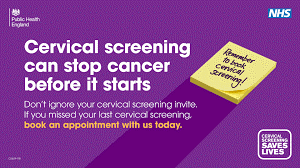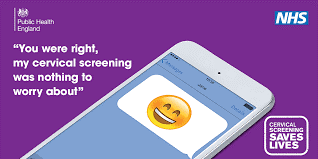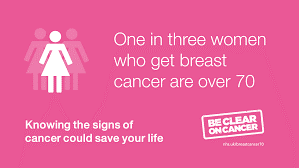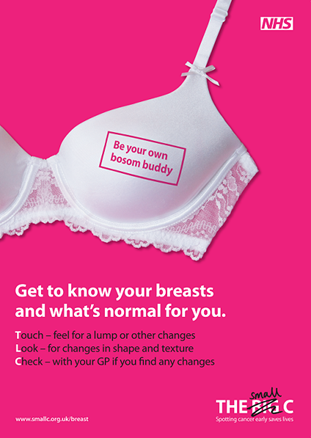Cancer screening programs (bowel, cervical & breast)
1. Bowel cancer screening
Why screening is offered
Bowel screening is a key way to save lives from bowel cancer. Regular NHS bowel cancer screening can detect invisible signs of bowel cancer. Bowel cancer is the 4th most common type of cancer. Screening can help find it at an early stage, when it's easier to treat successfully.
How to get a home test kit
Everyone aged 60 to 74 who is registered with a GP and lives in England is automatically sent a bowel cancer screening kit every 2 years. - The programme is expanding to make it available to everyone aged 50 to 59 years. This is happening gradually over 4 years and started in April 2021.
Make sure your GP practice has your correct address so your kit is posted to the right place.
If you're 75 or over, you can ask for a kit every 2 years by phoning the free bowel cancer screening helpline on 0800 707 60 60.
Red flag symptoms
If you are worried or have any of the symptoms below please see your GP.
- Bleeding from your bottom and/or blood in your poo
- A persistent and unexplained change in bowel habit
- Unexplained weight loss
- Extreme tiredness for no obvious reason
- A pain or lump in tummy
More information and advice
Call the free bowel cancer screening helpline on 0800 707 60 60 if:
- You have not had your result after 2 weeks from when you sent off your kit
- You want to know more about screening
- You do not want to be invited for bowel cancer screening

Useful Links
- How to do the FIT test – video https://www.youtube.com/watch?v=il6VSceMWfM
- How to do the FIT test – info sheet https://publications.cancerresearchuk.org/sites/default/files/publication-files/Tips%20for%20FIT%20England.pdf
- Bowel screening information in different languages https://www.gov.uk/government/publications/bowel-cancer-screening-benefits-and-risks
- Using your bowel cancer screening kit different languages (Videos) - Using your bowel cancer screening kit on Vimeo
- Easy read guide bowel screening https://assets.publishing.service.gov.uk/government/uploads/system/uploads/attachment_data/file/806904/
- Using your bowel cancer screening kit (BSL) - Using your bowel cancer screening kit (BSL) - Bing video
2. Cervical screening (smear test)
What is cervical screening?
Cervical screening (smear test) checks the health of your cervix. The cervix is the opening to your womb from your vagina.
It is not a test for cancer, it’s a test to help prevent cancer. All women and people with a cervix aged 25 to 64 should be invited by letter. If you are aged 25-49 screening should be carried out every 3 years. If you are 50-64 screening should be carried out every 5 years.
The sample is checked for certain types of human papillomavirus (HPV) that can cause changes to the cells of your cervix. These are called "high risk" types of HPV. If these types of HPV are not found, you do not need any further tests.
If these types of HPV are found, the sample is then checked for any changes in the cells of your cervix. These can then be treated before they get a chance to turn into cervical cancer.
When will you be screened?
You'll be sent an invitation letter in the post when it's time to book your cervical screening appointment.
|
Age |
When you’re invited |
|
Under 25 |
Up to 6 months before you turn 25 |
|
25 to 49 |
Every 3 years |
|
50 to 64 |
Every 5 years |
|
65 or older |
Only if 1 of your last 3 tests was abnormal |
You can book an appointment as soon as you get a letter. If you missed your last cervical screening, you do not need to wait for a letter to book an appointment.
What happens if I had my cervical screening done in another country?
If your last cervical screening test was done outside of England or Wales you will need to provide proof of the test result by email or by bringing to your practice so this can be added to your medical record.
How to book an appointment?
All cervical smear appointments are bookable online via the NHS App. You can also request an appointment using our online form Alternatively, click here to find the most suitable option for you.
Red flag symptoms
As well as going for screening you still need to be aware of any unusual symptoms, as they may be signs of cervical cancer. Although also common in other conditions the following could be signs of cervical cancer and should be checked out by your GP as soon as possible.
- abnormal bleeding (such as bleeding between periods)
- vaginal discharge that smells unpleasant
- pain during sex
More information and advice
Cervical screening - NHS (www.nhs.uk)
About cervical screening | Cervical cancer | Cancer Research UK


Information for people with learning disabilities
Public Health England and Jo's Cervical Cancer Trust have made a video about cervical screening for those with mild to moderate learning. Jo's Trust also have an easy read booklet.
Go to this information on Jo's Cervical Cancer Trust website
3. Breast Screening
What is Breast Screening?
The NHS offers screening to save lives from breast cancer. Screening does this by finding breast cancers at an early stage when they are too small to see or feel. Screening does not prevent you from getting breast cancer.
Breast screening uses a breast x-ray, called a mammogram, to look for cancer that may be too small to see or feel. The sooner breast cancer is diagnosed, the more effective treatment is likely to be. Screening can pick up breast cancer before there are any signs or symptoms.
When will I be invited for screening?
The NHS Breast Screening Programme invites all women and people from the age of 50 to 70 for screening every 3 years. This means that some people may not have their first screening mammogram until they are 52 or 53 years.
If you have not been invited for breast screening by the time you are 53 and think you should have been, contact your local breast screening service.
Overview - South East London (Kings) BSS - NHS (www.nhs.uk)
Tel - 020 3758 2024
Red flag symptoms
Most breast lumps are not cancerous, but it's always best to have them checked by a doctor.
You should see a GP if you notice any of the following:
- a new lump or area of thickened tissue in either breast that was not there before
- a change in the size or shape of one or both breasts
- a discharge of fluid from either of your nipples
- a lump or swelling in either of your armpits
- a change in the look or feel of your skin, such as puckering or dimpling, a rash or redness
- a rash (like eczema), crusting, scaly or itchy skin or redness on or around your nipple
- a change in the appearance of your nipple, such as becoming sunken into your breast
More information and advice
Breast cancer short films from partnership
Speak up, Say no to cancer, Together, It’s in your hands
Breast screening (mammogram) - NHS (www.nhs.uk)

BREAST CANCER 1
